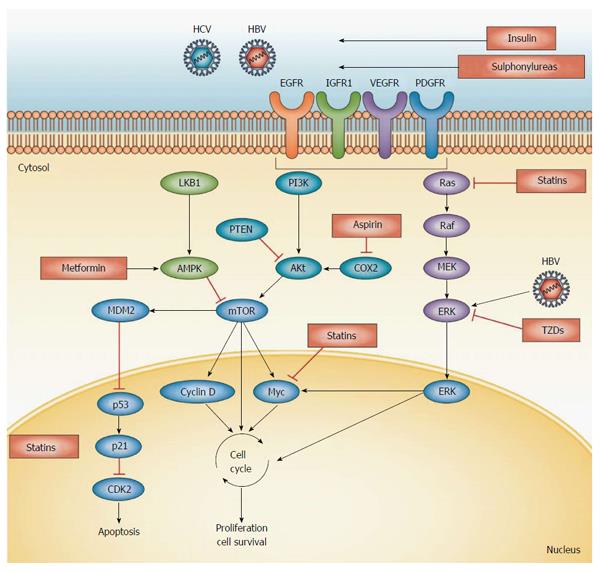Copyright
©The Author(s) 2016.
World J Gastroenterol. Jul 21, 2016; 22(27): 6201-6213
Published online Jul 21, 2016. doi: 10.3748/wjg.v22.i27.6201
Published online Jul 21, 2016. doi: 10.3748/wjg.v22.i27.6201
Figure 4 Pathogenesis of hepatocellular carcinoma and targets for chemopreventive agents.
Tyrosin kinase associated receptor pathways induce MAPK and PI3K-Akt kinase pathways in > 50% of HCCs. The resulting disruption of the mTOR pathwayh is seen in 40%-50% of cases of HCC, leading to inactivation of tumour suppressors such as PTEN. Statins block post-translational prenylation of Ras/Raf proteins, inhibit the activation of the proteasome pathway, limiting the degradation of the cyclin-dependent kinase inhibitors p21 and p27, and block Myc phosphorylation. Metformin activates AMPK, which inhibits the mTOR pathway. Thiazolidinediones inhibit the ubiquitin-proteasome system and extracellular signal-regulated kinase pathway. Insulin and sulphonylureas might promote hepatocarcinogenesis by increasing IGFR1 activity, enhancing growth-factor-dependent cell proliferation. AMPK: Adenosine monophosphate-activated protein kinase; HCC: Hepatocellular carcinoma; IGFR1: Insulin-like growth factor receptor 1; IR: Insulin receptor; MAPK: Ras mitogenactivated protein kinase; mTOR: Mammalian target of rapamycin; PI3K: Phosphatidylinositol 3-kinase; PPAR-γ: Peroxisome proliferator activated receptor γ[75]. With permission from Nature publishing group.
- Citation: Janicko M, Drazilova S, Pella D, Fedacko J, Jarcuska P. Pleiotropic effects of statins in the diseases of the liver. World J Gastroenterol 2016; 22(27): 6201-6213
- URL: https://www.wjgnet.com/1007-9327/full/v22/i27/6201.htm
- DOI: https://dx.doi.org/10.3748/wjg.v22.i27.6201









